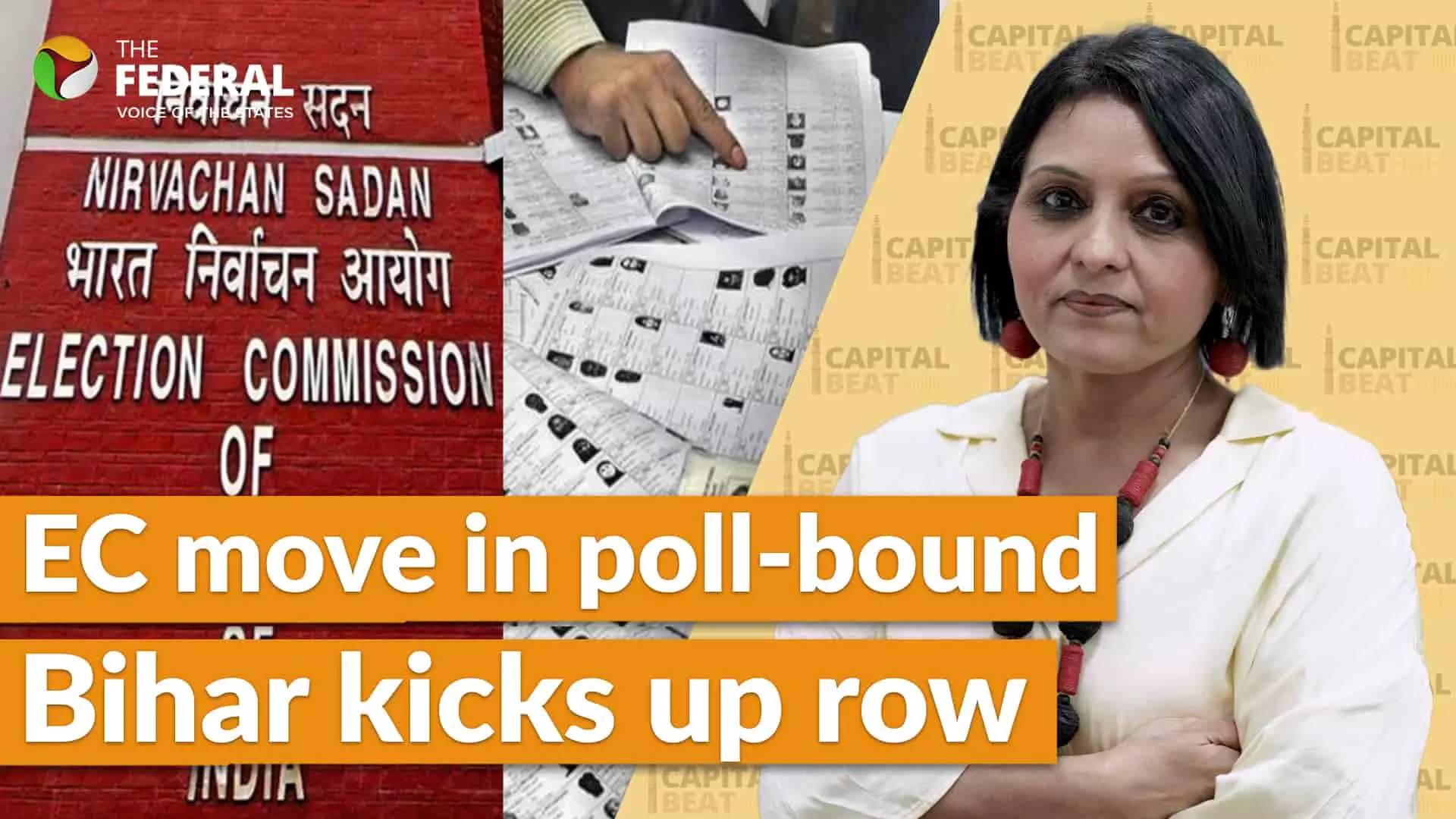
Discussion: EC's Bihar voter revision sparks disenfranchisement fears
Experts and political parties question the legality, feasibility, and timing of the Election Commission's intensive roll revision, fearing exclusion of vulnerable voters

In this episode of Capital Beat, senior journalist Ashok Mishra and noted election data scientist Dr. Pyare Lal Garg join to discuss the Election Commission of India’s (EC) recent decision to launch a Special Intensive Revision (SIR) of the electoral rolls in Bihar. With state elections around the corner, the EC’s move has sparked allegations of disenfranchisement and political motives, especially targeting vulnerable populations in the state.
What EC announced
The EC's SIR initiative includes door-to-door verification of voters and mandatory documentation to prove citizenship, especially for those born before 1987. Required documents include birth certificates, passports, matriculation certificates, government-issued IDs before July 1, 1987, and land or house allotment papers.
Also read: Ahead of Bihar polls, Nitish Kumar hikes social security pension three-fold
The EC has claimed that the purpose of the exercise is to ensure only legitimate Indian citizens are enrolled, especially in light of "illegal immigrants," rapid urbanisation, and internal migration. However, both panelists questioned the legality, feasibility, and timing of the move.
EC overstepping its mandate?
Dr. Garg categorically rejected the legitimacy of the EC’s demand for documentation, calling it unconstitutional and beyond the Commission’s mandate. “It is not the duty of the Election Commission to weed out people. Their duty is to register electors as per the Electors Registration Rules, 1960,” he stated.
Also read: Bihar elections 2025: Modi slams RJD-Congress, Lalu hits back
He cited Rule 8 and Form 4 of the registration rules, which only require a self-declaration of citizenship, not supporting documents. “The executor has no right to change a law… they can only issue instructions for implementation,” Dr. Garg asserted, likening ECI's actions to overreach that could endanger democracy.
Bureaucratic discretion and voter exclusion
Dr. Garg also raised alarm over bureaucratic discretion being handed to BLOs (Booth Level Officers), whom he described as “Class III employees often aligned with political parties”. These officers would now hold the power to determine voter eligibility, which he warned could be misused. “This is an attack on the poor and marginalised who don’t have birth certificates, pensions, or other historical records,” Garg warned, drawing parallels with the NRC process.
Also read: With an eye on CM’s chair, is Chirag set to unsettle Nitish Kumar?
He added that requiring documents from before 1987 would disenfranchise daily wage workers and rural citizens who never had these records. “Even I, a retired doctor, don’t have all the required documents they are asking for,” Garg remarked.
Targeted exclusion?
Mishra highlighted the logistical and political flaws in the EC’s decision. He said the timing and execution of the month-long SIR — between June 25 and July 25 — made the process practically impossible. “Enumerating 8 crore voters in one month is a fantasy. People from Bihar living in Gujarat, Jammu, or Chennai will not travel back just to update their records,” he said.
He argued that the exercise appeared aimed at excluding Muslim voters in districts like Kishanganj, Katihar, Purnia, and Araria — where the Muslim population ranges from 20 per cent to over 60 per cent. “This is not an enumeration drive. This is targeting a particular community under the garb of electoral clean-up,” Mishra alleged.
Document availability and ground realities
Both panellists underscored that Bihar’s birth registration rates hover around 60–70 per cent, primarily in urban areas. In rural zones, local panchayat systems are riddled with corruption, and people often don’t register births or deaths unless absolutely necessary, such as for school admissions.
Mishra reiterated, “This is an exercise doomed to fail because the infrastructure and time don’t support it. It will only result in large-scale deletion of names.”
Political reactions and legal recourse
According to Mishra, political parties, including the RJD, CPIML, and Congress, have strongly opposed the drive. The JD(U), while not officially critical yet, is also facing concerns from its cadre. Even some BJP members are uneasy about the potential backlash from their own voters, who may lose voting rights due to this revision.
He further revealed that the BJP is actively mobilising Bihari diaspora from cities like Delhi and Mumbai to return to Bihar and vote — a parallel exercise that underscores the political stakes.
Legal limits and democratic risks
Dr. Garg pointed out that such intensive revisions are not part of the EC's electoral mandate. “Only summary revisions are allowed before elections. Intensive revisions are neither legal nor feasible at this stage,” he said, warning that this sets a dangerous precedent.
He urged political parties not only to move courts but also to take to the streets. “The EC is not equipped to determine citizenship — that’s the Home Ministry’s job. By assuming extra powers, they are undermining the Constitution,” he said.
Mishra echoed that chaos is inevitable if this continues. “The number of electors will fall in certain areas and remain untouched in others, depending on who controls the ground-level process,” he warned.
As both panellists concluded, the EC’s voter roll revision in Bihar risks disenfranchising millions — especially the poor, marginalised, and migrant voters — under the guise of legitimacy. “It’s not just a question of feasibility,” Dr. Garg said, “but a question of whether this even falls under the EC’s legal jurisdiction.”
With elections approaching and deadlines looming, Bihar seems set for a politically and legally volatile few weeks ahead.
(The content above has been generated using a fine-tuned AI model. To ensure accuracy, quality, and editorial integrity, we employ a Human-In-The-Loop (HITL) process. While AI assists in creating the initial draft, our experienced editorial team carefully reviews, edits, and refines the content before publication. At The Federal, we combine the efficiency of AI with the expertise of human editors to deliver reliable and insightful journalism.)

